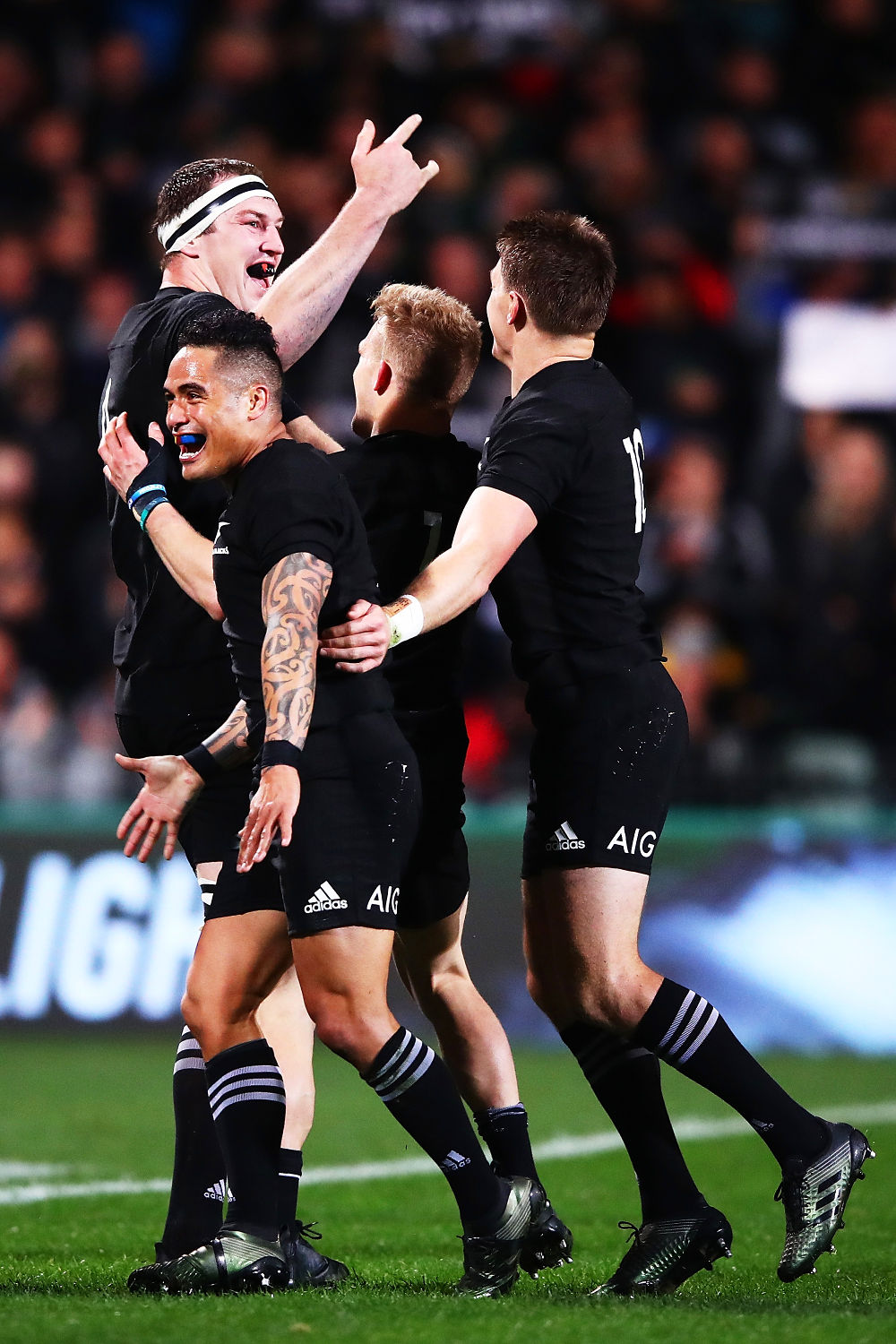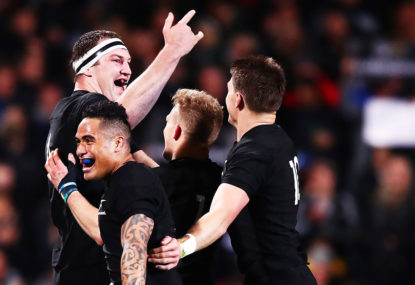After reading an article about Matt Todd, I started thinking about the number of players who have left our shores.
There’s always a lot said about the New Zealand rugby players who decide to leave the land of the long white cloud for pastures further afield. Currently New Zealand has “600 professional players off-shore” (1), but due to the country’s depth, this has had no real impact on the All Blacks.
That depth allows New Zealand to have a strict policy on only selecting home-based players. A move north “usually amounts to more pay for less work, something most of us wouldn’t even think twice about”. I certainly didn’t when I left New Zealand to work abroad. However, that being said, the player drain is something many fans despair about.
There are two schools of thought concerning the player drain. Some fans bemoan the decision the player has made, citing disloyalty and greed as the impetuous for leaving, and declare it will be the end of our dominance.
Of course the money is a factor. Playing for a club in either England or France can double or triple a player’s salary.
Even back in 2010, France was the destination of choice for those chasing the big salaries.
While at that stage a “middle-of-the-road England international [could] expect to rake in £320,000 a year (£170,000 from his club topped up by an additional £150,000 via an England contract)”, Johny Wilkinson earned “an astonishing £355,000 from Toulon, a flat figure which [did] not include bonuses or sponsorship deals estimated to increase Wilkinson’s yearly total to £700,000”.
Now while there is a salary cap in the Top 14, and the salary cap is well policed by the DNAGG (Direction Nationale d’Aide et de Contrôle de Gestion), Mourad Boudjellal, president of Toulon, “made no secret of the fact the club has been imaginative in ensuring its top players receive the sort of sums they deserve for their talent”.
For example, Dan Carter’s salary when he joined Racing Metro was around €500,000, but it was surmised he would “receive a similar sum from his image rights including an estimated €300,000 from the operating company of Arena 92”.
But leaving to earn larger salaries does not make the player a traitor. When speaking about the situation in South Africa, Mark Keohane asserts, that players heading overseas have “betrayed no one and are being no less patriotic than the doctor, accountant and other working professional whose skills command top currency outside South Africa” .
According to Forbes, there are five benefits of working abroad: Learning, Networking, Remuneration, Competition and Memories. They claim that New Zealanders are quite “open-minded to the benefits of working abroad”, so why do some fans give our rugby players such a hard time? I’ve read some pretty damning comments on social media when players announce their departure.
I think it’s personal disappointment at the loss of a favourite, and perhaps a bit of jealousy – the shoulda, coulda, woulda thinking pattern.
The second school of thought concerning the player drain, is one of indisputable support – ‘you do what you have to do for your career and family’. These fans are more pragmatic and don’t begrudge the player looking out for his future.
They support the player’s decision while simultaneously lamenting their departure.
I fall into this second category. When Malakai Fekitoa signed with Toulon I was disappointed, and yet I fully understood and supported his decision. My disappointment stemmed from my belief that he still had a lot to give the black jersey, and I wanted to see him fight for his place in the team. Fekitoa stated the main reason behind his decision to leave was “a slip down the pecking order with the All Blacks”. With a fair few new guys champing at the bit, he decided he didn’t want to “hang around and be a third or fourth choice”.
So yes, I’ll be disappointed I won’t see him playing for the Highlanders next season, but I wish him all the best for the new chapter of his life and will happily follow his career up north.
What we have to keep in mind is that a rugby player, unlike a lecturer, only has a small window of opportunity for top earnings.
Those heading overseas do so for various reasons – retirement from international rugby, not at the required level, on the fringe (second-tier players) or capped ABs tired of waiting on the sidelines.
While I think it’s something we obviously need to keep an eye on, I don’t think there’s any need for panic.
We’re lucky in that the black jersey holds enormous prestige, and players want to wear it.
We’re also lucky with our grassroots system which ensures new players are constantly coming through. We’re also lucky with NZR’s centralised system which safeguards the national team.
So what kind of money are we talking about? Over the last four years, the top salary has increased from €672,000 in 2014 (Johny Wilkinson), to €1,000,000 in 2015 (Dan Carter), to €1.58 million+ in 2016 (Ayumu Goromaru), and then to an estimated €1.67 million+ this year (Ayumu Goromaru). They’re pretty major increases over the last four years.
Presently, due to an increase in the salary cap, NZR has been able to keep our stars by offering fairly attractive salaries, in a New Zealand context, and by “providing pathways to develop career eduction, leadership, financial budgeting and offer quality coaching and competition pathways”. But if players who didn’t even start regularly for the All Blacks can earn $NZ1,000,000 a season in a Northern Hemisphere club, imagine the money being offered to the regular starters.
From 2013 to 2015, NZR “spent $125 million on its players” with $NZ60 million being “divided up between the five Super Rugby teams, equating to a ‘cap’ of about $4 million per-team, per-year”.
Compare that to England’s cap of around $NZ11.84m and France’s of $NZ15.25m. In 2016, a new collective agreement between NZR and the Players’ Association saw an “increase of $70 million in the player payment pool from $121m to $191m over the next three years”.

(Photo by Hannah Peters/Getty Images)
McCaw and Carter are thought to have earned more than $NZ1m, but that included endorsement and sponsorship deals, “Read will reach $1m before those add-ons are considered”. Obviously keeping our best players in New Zealand is something NZR are constantly working on.
Steve Hansen got into some hot water earlier this year for his “Ex New Zealander” (11) comment aimed at Pat Lam for luring away top domestic players.
I can understand why Lam was disappointed with the label; I’d be brassed off to be called an Ex NZer too. But I’m not contributing to the rise of overseas teams in what’s becoming a very competitive market.
Gregor Paul makes a very good point when he suggests that the player drain illustrates “how much intellectual property has been freely given to New Zealand’s biggest competitors”.
If a player is developed by Manchester United and goes through their academy, and is then poached by Real Madrid, “the latter has to pay a small fortune – a trade barrier of sorts that prevents the free flow of intellectual property”.
It’s not a coincidence that the world is catching up with New Zealand rugby. It can be directly attributed to the coaches and players taking New Zealand rugby knowledge with them to their new clubs, who are getting better “at New Zealand’s expense”.
Consider what Cotter, Gatland and Schmidt have done for Scotland, Wales and Ireland respectively.
The players are fitter, better able to play 80-minutes of rugby, and are able to “exert more pressure on opponents now, because they have improved their basic skills”. This situation reminds me of the overseas companies profiting from NZ’s water. There should be a payment of some description.
So do I begrudge players and coaches heading overseas. No, not one bit. I’d be a hypocrite if I did. I don’t blame Matt Todd for being non-committal about his future. He’s been a great employee of NZR, and to many, an unlucky one.
He’s never stopped trying to improve and has a work rate to admire. He may be one of Hansen’s “favourite players” but is that enough to sustain ambition? According to Todd, “”If you drop your lip or don’t work as hard when you’re not in here, when that opportunity does present itself you won’t be in a position to take it and then you let yourself down”. And he certainly has never done that. So would I support him if he decides to go… yes. But if that happens, I think New Zealand should get some renumeration.
NZR should benefit from the diaspora of players and coaches. Imagine the increase in revenue if every club enticing our players had to pay NZR for signing them. We would then be guaranteed the money needed to keep the players we want to keep.
This is not a new situation. It’s been around since rugby went professional in 1995, and it will continue as long as rugby is being played. But there needs to be some rule changes. WR needs to incorporate the same policy soccer has.
Perhaps then we wouldn’t hear the horror stories about players being lured overseas by promises of this and that, only to find they’re left out in the cold when they’re no longer needed.
I think New Zealand has the ability to stay one step ahead. Let’s face it, overseas teams playing our brand of rugby is good for us; it keeps us on our toes. The old adage of how it’s easier to get to the top than stay there springs to mind.
But what I don’t get is that many people sign confidentiality agreements these days so if they change jobs they can’t give away all their trade secrets; that’s pretty standard of a lot of businesses. So why is rugby being so (stupidly) generous?
To quote Gregor Paul, “The offshore markets have money and demand – New Zealand has supply … market forces will always prevail”.






























































































